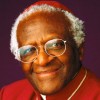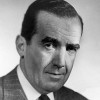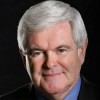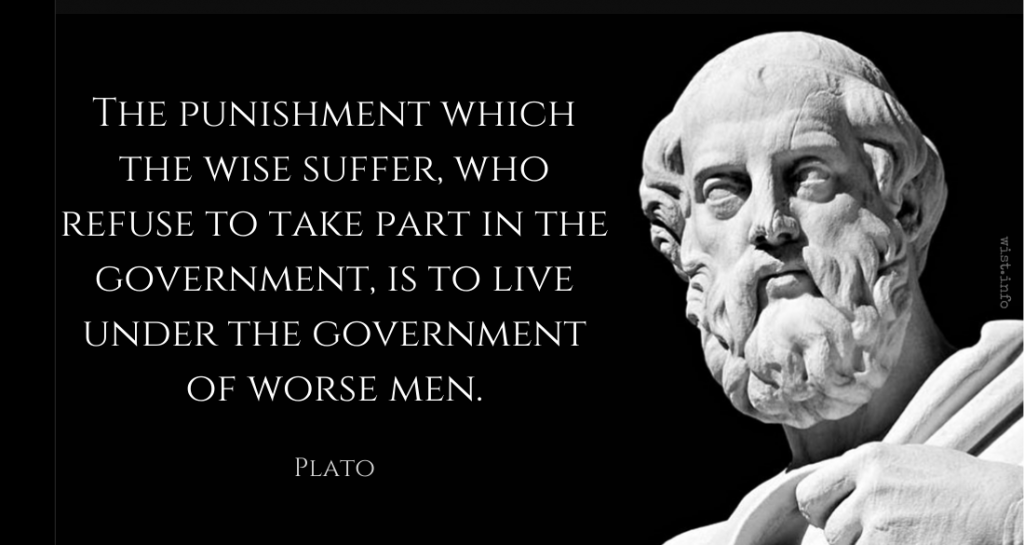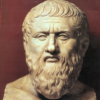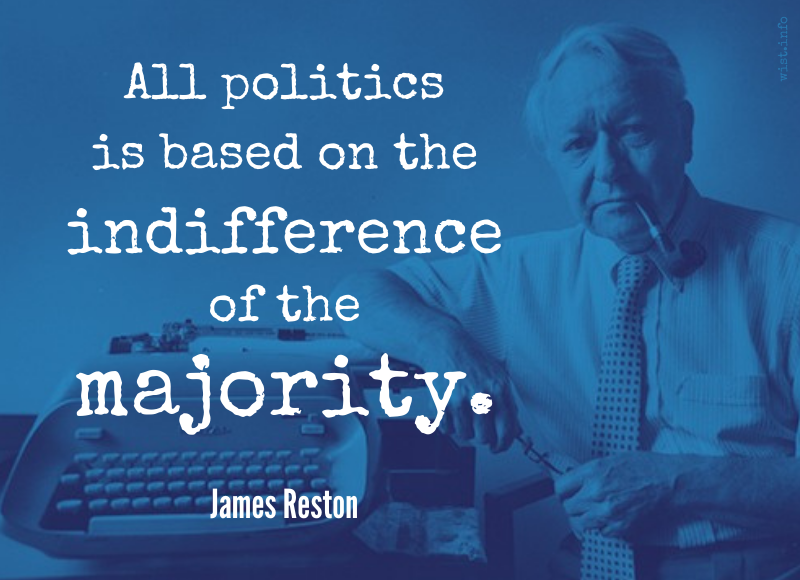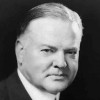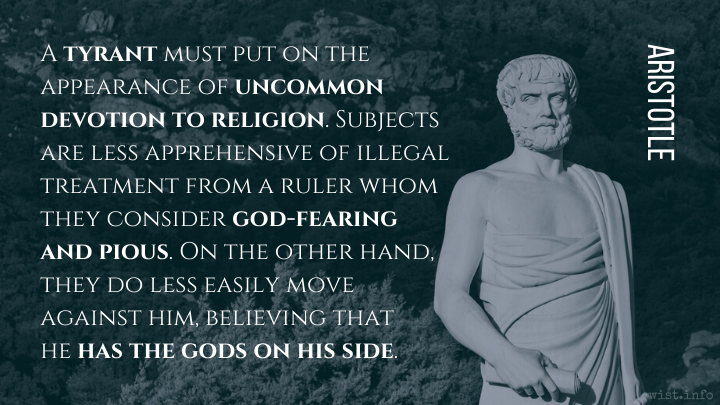In politics, again, it is almost a commonplace, that a party of order or stability, and a party of progress or reform, are both necessary elements of a healthy state of political life. […] Each of these modes of thinking derives its utility from the deficiencies of the other; but it is in a great measure the opposition of the other that keeps each within the limits of reason and sanity.
John Stuart Mill (1806-1873) English philosopher and economist
On Liberty, ch. 2 “Of the Liberty of Thought and Discussion” (1859)
(Source)
Quotations about:
politics
Note not all quotations have been tagged, so Search may find additional quotes on this topic.
Ignorance maketh most Men go into a Party, and Shame keepeth them from getting out of it.
George Savile, Marquis of Halifax (1633-1695) English politician and essayist
“Of Parties,” Political, Moral, and Miscellaneous Thoughts and Reflections (1750)
(Source)
This is a column for everyone who ever said, “I’m sorry, I’m just not interested in politics,” or, “There’s nothing I can do about it,” or, “Hey, they’re all crooks anyway.” … I’ve got one word for all of you: Katrina. … This, friends, is why we need to pay attention to government policies, not political personalities, and to know whereon we vote. It is about our lives.
Churches are becoming political organizations … It probably will not be long until the churches will divide as sharply upon political, as upon theological questions; and when that day comes, if there are not liberals enough to hold the balance of power, this Government will be destroyed.
Robert Green Ingersoll (1833-1899) American lawyer, agnostic, orator
Some Mistakes of Moses, Sec. 3 “The Politicians” (1879)
(Source)
From these things therefore it is clear that the city-state is a natural growth, and that man is by nature a political animal, and a man that is by nature and not merely by fortune citiless is either low in the scale of humanity or above it, like the “clanless, lawless, hearthless” man reviled by Homer, for one by nature unsocial is also ‘a lover of war’ inasmuch as he is solitary, like an isolated piece at draughts.
[ἐκ τούτων οὖν φανερὸν ὅτι τῶν φύσει ἡ πόλις ἐστί, καὶ ὅτι ὁ ἄνθρωπος φύσει πολιτικὸν ζῷον, καὶ ὁ ἄπολις διὰ φύσιν καὶ οὐ διὰ τύχην ἤτοι φαῦλός ἐστιν, ἢ κρείττων ἢ ἄνθρωπος: ὥσπερ καὶ ὁ ὑφ᾽ Ὁμήρου λοιδορηθεὶς “ἀφρήτωρ ἀθέμιστος ἀνέστιος:” ἅμα γὰρ φύσει τοιοῦτος καὶ πολέμου ἐπιθυμητής, ἅτε περ ἄζυξ ὢν ὥσπερ ἐν πεττοῖς.]
Aristotle (384-322 BC) Greek philosopher
Politics [Πολιτικά], Book 1, ch. 2 / 1253a.2 [tr. Rackham (1932)]
(Source)
See Homer. Original Greek. Alternate translations:
From these considerations, therefore, it is clear that the State is one of Nature's productions, and that man is by nature a social animal, and that a man who is without a country through natural taste and not misfortune is certainly degraded (or else a being superior to man), like that man reviled by Homer as clanless, lawless, homeless. For he is naturally of this character and desirous of war, since he has no ties, like an exposed piece in the game of backgammon.
[tr. Bolland (1877)]
Hence it is evident that the state is a creation of nature, and that man is by nature a political animal. And he who by nature and not by mere accident is without a state, is either a bad man or above humanity; he is like the "tribeless, lawless, hearthless one," whom Homer denounces -- the natural outcast is forthwith a lover of war; he may be compared to an isolated piece at draughts.
[tr. Jowett (1885)]
Hence it is evident that a city is a natural production, and that man is naturally a political animal, and that whosoever is naturally and not accidentally unfit for society, must be either inferior or superior to man: thus the man in Homer, who is reviled for being "without society, without law, without family." Such a one must naturally be of a quarrelsome disposition, and as solitary as the birds.
[tr. Ellis (1912)]
From these things it is evident, then, that the city belongs among the things that exist by nature, and that man is by nature a political animal. He who is without a city through nature rather than chance is either a mean sort or superior to man; he is "without clan, without law, without hearth," like the person reproved by Homer; for the one who is such by nature has by this fact a desire for war, as if he were an isolated piece in a game of backgammon.
[tr. Lord (1984)]
If a man has a genuine, sincere, hearty wish to get rid of his liberty, if he is really bent upon becoming a slave, nothing can stop him. And the temptation is to some natures a very great one. Liberty is often a heavy burden on a man. It involves that necessity for perpetual choice which is the kind of labor men have always dreaded. In common life we shirk it by forming habits, which take the place of self-determination. In politics party-organization saves us the pains of much thinking before deciding how to cast our vote. In religious matters there are great multitudes watching us perpetually, each propagandist ready with his bundle of finalities, which having accepted we may be at peace. The more absolute the submission demanded, the stronger the temptation becomes to those who have been long tossed among doubts and conflicts.
Oliver Wendell Holmes, Sr. (1809-1894) American poet, essayist, scholar
Elsie Venner, ch. 18 (1859)
(Source)
We are not a cynical people. The will to believe lingers on. We like to think that heroes can emerge from obscurity, as they sometimes do; that elections do matter, even though the process is at least part hokum; that through politics we can change our society and maybe even find a cause to believe in.
And he gave it for his opinion, that whosoever could make two ears of corn or two blades of grass to grow upon a spot of ground where only one grew before, would deserve better of mankind, and do more essential service to his country, than the whole race of politicians put together.
Here’s the way I look at it. President Bush has uranium-tipped bunker busters and I have puns. I think he’ll be okay.
Jon Stewart (b. 1962) American satirist, comedian, and television host. [b. Jonathan Stuart Leibowitz]
Interview, Rolling Stone (2006-10-31)
(Source)
On political satire.
I reject the idea there are just two sides. I think that with the amount of ideas and thoughts there are, it’s not even going to be consistent with the same person. People can hold liberal and conservative dogma points at the same time. They’re not living their lives via platforms. They’re living their lives. The whole thing is an awfully tired construct.
Jon Stewart (b. 1962) American satirist, comedian, and television host. [b. Jonathan Stuart Leibowitz]
“No News Is Good News,” interview by Adam Bulger, The Hartford Advocate (2008-06-12)
(Source)
If I was to really get at the burr in my saddle, it’s not politics — and this is, I think, probably a horrible analogy — but I look at politicians as, they are doing what inherently they need to do to retain power. Their job is to consolidate power. When you go to the zoo and you see a monkey throwing poop, you go, “that’s what monkeys do, what are you gonna do?” But what I wish the media would do more frequently is say “bad monkey.”
Jon Stewart (b. 1962) American satirist, comedian, and television host. [b. Jonathan Stuart Leibowitz]
Interview by Charlie Rose (2004-09-29)
Full text.
I do not preach a social gospel; I preach the Gospel, period. The gospel of our Lord Jesus Christ is concerned for the whole person. When people were hungry, Jesus didn’t say, “Now, is that political, or social?” He said, “I feed you.” […] I can’t believe that you can compartmentalize life and say this is political and this is religious, because for us religion must permeate the whole of life. If people wish to say, “God’s writ does not run in the political sphere,” I want to ask, “Whose does?”
Desmond Tutu (1931-2021) South African cleric, Anglican Archbishop of Cape Town, Nobel Laureate
“The Bishop and South Africa,” interview by Rafael Suarez, Jr., Worldview (Dec 1984)
(Source)
You ask, What makes it worth defending? and the only answer I can give is this: Freedom to write, freedom to read, freedom to own material that you believe is worth defending means you’re going to have to stand up for stuff you don’t believe is worth defending, even stuff you find actively distasteful, because laws are big blunt instruments that do not differentiate between what you like and what you don’t, because prosecutors are humans and bear grudges and fight for re-election, because one person’s obscenity is another person’s art. Because if you don’t stand up for the stuff you don’t like, when they come for the stuff you do like, you’ve already lost.
Neil Gaiman (b. 1960) British author, screenwriter, fabulist
Blog entry (2008-12-01), “Why defend freedom of icky speech?”
(Source)
It is high time that we stopped thinking politically as Republicans and Democrats about elections and started thinking patriotically as Americans about national security based on individual freedom. It is high time that we all stopped being tools and victims of totalitarian techniques — techniques that, if continued here unchecked, will surely end what we have come to cherish as the American Way of Life.
Margaret Chase Smith (1897-1965) American politician (US Senator, Maine)
“Declaration of Conscience,” Congressional Record, vol. 96, 81st Congress, 2d. sess. (1 Jun 1950)
(Source)
No other touchstone can test the heart of a man,
The temper of his mind and spirit, till he be tried
In the practice of authority and rule.[ἀμήχανον δὲ παντὸς ἀνδρὸς ἐκμαθεῖν
ψυχήν τε καὶ φρόνημα καὶ γνώμην, πρὶν ἂν
ἀρχαῖς τε καὶ νόμοισιν ἐντριβὴς φανῇ.]Sophocles (496-406 BC) Greek tragic playwright
Antigone, l. 175ff [Creon] (441 BC) [tr. Watling (1947)]
(Source)
Alt. trans.:
There is no man whose soul and will and meaning
Stand forth as outward things for all to see,
'Till he has shown himself by practice versed
In ruling under law and making laws.
[tr. Donaldson (1848)]
But hard it is to learn
The mind of any mortal or the heart,
Till he be tried in chief authority.
Power shows the man.
[tr. Campbell (1873)]
Yet 'tis no easy matter to discern
The temper of a man, his mind and will,
Till he be proved by exercise of power.
[tr. Storr (1859)]
Now, it is impossible to know fully any man's character, will, or judgment, until he has been proved by the test of rule and law-giving.
[tr. Jebb (1891)]
Never can man be known.
His mind, his will, his passion ne'er appear,
Till power and office call them forth.
[tr. Werner (1892)]
No man can be fully known, in soul and spirit and mind, until he hath been seen versed in rule and law-giving.
[tr. Jebb (1917)]
I am aware, of course, that no Ruler can expect complete loyalty from his subjects until he has been tested in office.
[tr. Fitts/Fitzgerald (1939)]
You cannot learn of any man the soul,
the mind, and the intent until he shows
his practice of the government and law.
[tr. Wyckoff (1954)]
There is no art that teaches us to know
The temper, mind, or spirit of any man
Until he has been proved by government
And lawgiving.
[tr. Kitto (1962)]
Of course you cannot know a man completely,
his character, his principles, sense of judgment,
not till he's shown his colors, ruling the people,
making laws. Experience, there's the test.
[tr. Fagles (1982), l. 194ff]
No man has a mind that can be fully known,
In character or judgment, till he rules and makes law.
[tr. Woodruff (2001)]
Now, there is no way to learn thoroughly the essence
of the whole man as well as his thought and judgment
until he has been seen engaged in ruling and making laws.
[tr. Tyrell/Bennett (2002)]
It’s impossible
to really know a man, to know his soul,
his mind and will, before one witnesses
his skill in governing and making laws.
[tr. Johnston (2005), ll. 198-201]
It is impossible to really learn a man’s
mind, thought and opinion before he’s been initiated
into the offices and laws of the state.
[tr. @sentantiq (2020)]
Once you touch the biographies of human beings, the notion that political beliefs are logically determined collapses like a pricked balloon.
Walter Lippmann (1889-1974) American journalist and author
A Preface to Morals, ch. 7 (1913)
(Source)
War is not merely a political act but a real political instrument, a continuation of political intercourse, a carrying out of the same by other means.
[Der Krieg nicht bloss ein politischer Akt, sondern ein wahres politisches Instrument ist, eine Fortsetzung des politischen Verkhers, ein Durchführen desselben mit andern Mitteln.]
Karl von Clausewitz (1780-1831) Prussian soldier, historian, military theorist
On War [Vom Kriege], Book 1, ch. 1 “What is War? [Was ist der Krieg?],” § 24 (1.1.24) (1832) [tr. Jolles (1943)]
(Source)
(Source (German)). Alternate translations:
War is not merely a political act, but also a real political instrument, a continuation of political commerce, a carrying out of the same by other means.
[tr. Graham (1874)]
War is not merely an act of policy but a true political instrument, a continuation of political intercourse, carried on with other means.
[tr. Howard & Paret (1976)]
There is often confusion between this full sentence and the shorter section heading, which is also quoted:
War is a mere continuation of policy by other means.
[tr. Graham (1874) and Jolles (1943)]
War is merely the continuation of policy by other means.
[tr. Howard & Paret (1976)]
Der Krieg ist eine blosse Fortsetzung der Politik mit andern Mitteln.
[German source]
Every political good carried to the extreme must be productive of evil.
Mary Wollstonecraft (1759-1797) English social philosopher, feminist, writer
The French Revolution, Book 5, ch. 4 (1794)
(Source)
The true rule, in determining to embrace, or reject any thing, is not whether it have any evil in it; but whether it have more of evil, than of good. There are few things wholly evil, or wholly good. Almost every thing, especially of governmental policy, is an inseparable compound of the two; so that our best judgment of the preponderance between them is continually demanded.
Abraham Lincoln (1809-1865) American lawyer, politician, US President (1861-65)
Remarks, House of Representatives (1848-06-20)
(Source)
Speaking on internal improvements (infrastructure) as part of governmental policy.
Those words, “temperate and moderate,” are words either of political cowardice, or of cunning, or seduction. A thing moderately good, is not so good as it ought to be. Moderation in temper, is always a virtue; but moderation in principle, is a species of vice.
Thomas Paine (1737-1809) American political philosopher and writer
“Letter Addressed to the Addressers on the Late Proclamation” (1791)
(Source)
When religion becomes a mere artificial façade to justify a social or economic system — when religion hands over its rites and language completely to the political propagandist, and when prayer becomes the vehicle for a purely secular ideological program, then religion does tend to become an opiate. It deadens the spirit enough to permit the substitution of a superficial fiction and mythology for the truth of life. And this brings about the alienation of the believer, so that his religious zeal becomes political fanaticism. His faith in God, while preserving its traditional formulas, becomes in fact faith in his own nation, class or race. His ethic ceases to be the law of God and love, and becomes the law of might-makes-right: established privilege justifies everything. God is the status quo.
The majority of Americans are clustered in the middle of the ideological spectrum. There is a passionate center. This core of America is not racist. It is not hostile to women. It is increasingly offended by gay bashing. Yet it abhors government waste. It believes strongly in fiscal responsibility such as balanced budgets. It is pro-economic growth. It is concerned about the environment. It is intolerant of people on welfare who disdain the notion of work. But it wants poor kids to have school lunches and it wants to spend money to have good schools. In sum, most Americans are sensible, good-hearted, and prudent. The issue, then, is whether there is a political party that can welcome them home.
Paul Tsongas (1941-1997) American politician
Journey of Purpose, ch. 3 “Third Party” (1995)
(Source)
When I, a thoughtful and unblessed Presbyterian, examine the Koran, I know that beyond any question every Mohammedan is insane; not in all things, but in religious matters. When a thoughtful and unblessed Mohammedan examines the Westminster Catechism, he knows that beyond any question I am spiritually insane. I cannot prove to him that he is insane, because you never can prove anything to a lunatic — for that is a part of his insanity and the evidence of it. He cannot prove to me that I am insane, for my mind has the same defect that afflicts his. All Democrats are insane, but not one of them knows it; none but the Republicans and Mugwumps know it. All the Republicans are insane, but only the Democrats and Mugwumps can perceive it. The rule is perfect: in all matters of opinion our adversaries are insane.
Mark Twain (1835-1910) American writer [pseud. of Samuel Clemens]
Christian Science, ch. 5 (1907)
(Source)
Often misattributed to Oscar Wilde.
The punishment which the wise suffer who refuse to take part in the government is to live under the government of worse men.
Plato (c.428-347 BC) Greek philosopher
Republic, Book 1, 347c
In Ralph Waldo Emerson, "Eloquence," Society and Solitude (1870).
Alt. trans.:More discussion here.
- "One of the penalties for refusing to participate in politics, is that you end up being governed by your inferiors."
- The Constitution Party (1952-68) used on their letterhead the variant, "The penalty good men pay for indifference to public affairs is to be ruled by evil men."
- "The price of apathy is to be ruled by evil men."
- "Those who are too smart to engage in politics are punished by being governed by those who are dumber."
In context (Plato in Twelve Volumes, Vols. 5 & 6 [tr. Shorey (1969)]):[346e] "Then, Thrasymachus, is not this immediately apparent, that no art or office provides what is beneficial for itself -- but as we said long ago it provides and enjoins what is beneficial to its subject, considering the advantage of that, the weaker, and not the advantage the stronger? That was why, friend Thrasymachus, I was just now saying that no one of his own will chooses to hold rule and office and take other people's troubles in hand to straighten them out, but everybody expects pay for that, [347a] because he who is to exercise the art rightly never does what is best for himself or enjoins it when he gives commands according to the art, but what is best for the subject. That is the reason, it seems, why pay must be provided for those who are to consent to rule, either in form of money or honor or a penalty if they refuse." "What do you mean by that, Socrates?" said Glaucon. "The two wages I recognize, but the penalty you speak of and described as a form of wage I don't understand." "Then," said I, "you don't understand the wages of the best men [347b] for the sake of which the finest spirits hold office and rule when they consent to do so. Don't you know that to be covetous of honor and covetous of money is said to be and is a reproach?" "I do," he said. "Well, then," said I, "that is why the good are not willing to rule either for the sake of money or of honor. They do not wish to collect pay openly for their service of rule and be styled hirelings nor to take it by stealth from their office and be called thieves, nor yet for the sake of honor, [347c] for they are not covetous of honor. So there must be imposed some compulsion and penalty to constrain them to rule if they are to consent to hold office. That is perhaps why to seek office oneself and not await compulsion is thought disgraceful. But the chief penalty is to be governed by someone worse if a man will not himself hold office and rule. It is from fear of this, as it appears to me, that the better sort hold office when they do, and then they go to it not in the expectation of enjoyment nor as to a good thing, but as to a necessary evil and because they are unable to turn it over to better men than themselves [347d] or to their like. For we may venture to say that, if there should be a city of good men only, immunity from office-holding would be as eagerly contended for as office is now, and there it would be made plain that in very truth the true ruler does not naturally seek his own advantage but that of the ruled; so that every man of understanding would rather choose to be benefited by another than to be bothered with benefiting him. "
The illegal we do immediately. The unconstitutional takes a little longer.
Henry Kissinger (b. 1923) German-American diplomat
Quoted in Washington Post (23 Dec 1973)
See Santayana.
You know, the more you read and observe about this Politics thing, you got to admit that each party is worse than the other. The one that’s out always looks the best.
Will Rogers (1879-1935) American humorist
“Weekly Article” column (1922-12-31)
(Source)
Reprinted in The Illiterate Digest, "Breaking into the Writing Game" (1924)
Often paraphrased along the lines of, "The more you observe politics, the more you've got to admit that each party is worse than the other."
All politics is based on the indifference of the majority.
James "Scotty" Reston (1909-1995) Scottish-American journalist and editor
“New York: Rockefeller Comes Out of His Trance,” New York Times (12 Jun 1968)
(Source)
This is cited in multiple places to this 1968 op-ed, to which I don't have access. Reston also used the phrase in this 1972 op-ed.
The politics of the university are so intense because the stakes are so low.
Wallace Sayre (1905-1972) U.S. political scientist, academic
Sayre’s Third Law
One of several formulations of the same sentiment, which has also been attributed to Richard Neustadt, Jesse Unruh, Henry Kissinger ("University politics are vicious precisely because the stakes are so small"), Charles Philip Issawi ("In any dispute the intensity of feeling is inversely proportional to the value of the issues at stake. That is why academic politics are so bitter"), Lawrence Peter, C.P. Snow, and others, with antecedents by Samuel Johnson and Woodrow Wilson. Most of the attributions come in the early-mid 1970s, though Herbert Kaufman, a colleague, claimed Sayres had used the phrase for decades.
See also Quote Investigator, Quote Verifier, and Wikipedia for more discussion.
I am not willing, now or in the future, to bring bad trouble to people who, in my past association with them, were completely innocent of any talk or any action that was disloyal or subversive. I do not like subversion or disloyalty in any form and if I had ever seen any I would have considered it my duty to have reported it to the proper authorities. But to hurt innocent people whom I knew many years ago in order to save myself is, to me, inhuman and indecent and dishonorable. I cannot and will not cut my conscience to fit this year’s fashions, even though I long ago came to the conclusion that I was not a political person and could have no comfortable place in any political group.
Lillian Hellman (1905-1984) American playwright, screenwriter
Letter to Rep. John S. Wood, House Committee on Un-American Activities (19 May 1952)
(Source)
National Archives copy. Reprinted in The Nation (31 May 1952).
In the letter Hellman offers to come before the committee and talk of her own life and beliefs, but not if she could then be compelled to "name names" of others. As a result of the letter and her invoking the Fifth Amendment at the HUAC hearings, Hellman was put on the Hollywood Blacklist for the rest of the decade.
Ours is a practical people, to whom ideals furnish the theory of political action, upon which they want not only firm assurance, but also effective practice. They want programmes, but they want action to flow from them. They want constructive common sense. They want the development of the common will, not the views of a single individual. They are beginning to realize that words without action are the assassins of idealism.
A tyrant must put on the appearance of uncommon devotion to religion. Subjects are less apprehensive of illegal treatment from a ruler whom they consider god-fearing and pious. On the other hand, they do less easily move against him, believing that he has the gods on his side.
Aristotle (384-322 BC) Greek philosopher
Politics [Πολιτικά], Book 5, ch. 11 / 1314b.39
Alt. trans.:
- "Also he should appear to be particularly earnest in the service of the Gods; for if men think that a ruler is religious and has a reverence for the Gods, they are less afraid of suffering injustice at his hands, and they are less disposed to conspire against him, because they believe him to have the very Gods fighting on his side. At the same time his religion must not be thought foolish." [tr. Jowett (1885)]
- "And, moreover, always to seem particularly attentive to the worship of the gods; for from persons of such a character men entertain less fears of suffering anything illegal while they suppose that he who governs them is religious and reverences the gods; and they will be less inclined to raise insinuations against such a one, as being peculiarly under their protection: but this must be so done as to give no occasion for any suspicion of hypocrisy." [tr. Ellis (1912)]
- "And further he must be seen always to be exceptionally zealous as regards religious observances (for people are less afraid of suffering any illegal treatment from men of this sort, if they think that their ruler has religious scruples and pays regard to the gods, and also they plot against him less, thinking that he has even the gods as allies), though he should not display a foolish religiosity." [tr. Rackham (1932)]
- "Further, he must always show himself to be seriously attentive to the things pertaining to the gods. For men are less afraid fo being treated in some respect contrary to the law by such persons, if they consider the ruler a god-fearing sort who takes thought for the gods, and they are less ready to conspire against him as one who has the gods too as allies. In showing himself of this sort, however, he must avoid silliness." [tr. Lord (1984)]











